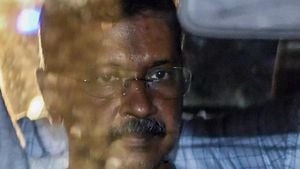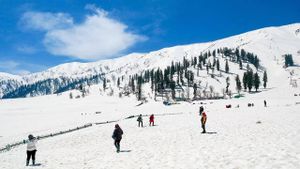With the geopolitical winds continuously shifting, Russia's maneuvering on the global stage has drawn both scrutiny and serious consequences. Central to this narrative is the interplay between Russia, the West, and the countries allied to or directly involved with Moscow. Set against the backdrop of mounting sanctions, especially from nations like the European Union and the United Kingdom, the chess game is complex and multifaceted, involving numerous players and dynamics.
Recently, the EU and the UK announced sanctions targeting Iran, ostensibly accusing the country of supplying ballistic missiles to Russia. The sanctions, which took effect on November 19, came after uncorroborated claims about military supply chains between Iran and Russia were made. Specifically, the sanctions focused on Iranian entities like the Islamic Republic of Iran Shipping Lines (IRISL) and Iran Air. The UK seized assets linked to these entities, asserting they were complicit in assisting Russia's military endeavors.
Iran, standing firm against these allegations, released statements through its Foreign Ministry, strongly denying any involvement in supplying missiles to Russia. Spokesman Esmail Baghaei called the efforts by the EU and UK “unfounded,” noting even Ukrainian President Volodymyr Zelenskyy had previously admitted there was no evidence supporting claims of missile sales from Iran to Russia. This situation begs the question: are these sanctions truly about stopping illicit trade, or are they part of larger political gamesmanship?
Despite Iran's vociferous denials and protests against the sanctions, the narrative of military support persists. The West continues to paint Tehran's collaboration with Moscow as threatening to global peace, particularly with respect to Syria and the continuing conflict involving Ukraine. Countries like France and Germany, signatories of the Joint Comprehensive Plan of Action (JCPOA), are also tightening the screws on Iran’s economic avenues ostensibly to counteract what they describe as destabilizing activities.
This is not merely about Iran, though. Many analysts suggest these sanctions reflect broader geopolitical struggles, with Russia using its relationships—both with Iran and other allies—to fortify its position against Western sanctions. The Kremlin appears to be consolidative, forging partnerships with North Korea and Taliban-controlled Afghanistan, positioning itself as the leader of those countering Western hegemony. This is indicative of Russia's attempt to maneuver out of growing international isolation.
Meanwhile, back within Russia, public support for the actions taken by the armed forces against Ukraine remains high, at about 76%. Reports indicate this support stems from deep-seated national pride and resilience expertly stoked by state propaganda. Much akin to the environment of compliance found during significant historical events, like World War II, many Russians support what they perceive as their country asserting itself on the international stage.
The Russian opposition offers insight on this public sentiment as well. Notably, opposition leaders have tried to frame the narrative such as by exclusively attributing the war's responsibilities to Putin. Critics argue this oversimplifies the situation, asserting such public support is reflective of collective sentiments for prevailing policies and the broader Russian imperial aspirations stemming from historic narratives even prior to Bolshevism.
Confronted with mounting economic challenges due to sanctions, there's skepticism about how effectively Russia can sustain its military activities and support relationships echoed by figures like former President Dmitry Medvedev. The Kremlin's strategy includes engaging with countries perceived as adversaries to the West, illustrating how its foreign policy is informed by resentment rooted deeply within its historical narrative. Medvedev’s recognition of attempting to fracture the US and humiliate Europe signals these imperial ambitions.
It gets complex when considering the impact of sanctions aimed at undermining the Kremlin's operational capabilities. Yet, those sanctions appear to be twofold. While they target the government, they often end up punishing the general populace. Public opinion shapes heavily under the weight of state-controlled media narratives, emphasizing hardships faced by ordinary Russians—framing sanctions as instruments of Western oppression rather than tangible steps to halt Russian military aggression.
This perspective creates fertile ground for the Kremlin's aggressive posture. According to some experts, this blend of hyper-nationalism and despair plays straight to the hands of those governing the nation, crafting narratives where the West is the enemy rather than focusing on internal governance and societal responsibilities. It fuels the mythos of Russia as the last bastion against Western decadence.
Looking at the role of the managed opposition within Russia illuminates the fractures within its political structure. Exiled opposition figures, lacking significant political influence domestically, are often co-opted to participate unwittingly in Russia's propaganda wars aimed at mitigating international isolation. Their presence occasionally legitimizes the establishment’s narrative, creating distractions rather than fostering genuine dissent.
This narrative management serves dual purposes. By allowing some form of opposition to exist, the Kremlin crafts the image of engagement with the West, portraying Russia as having voices calling for peace amid chaos. This weakens the notion of collective Russian guilt for actions taken under Putin's regime, thereby shifting accountability solely onto the elite and the government.
Addressing public perceptions of the West, it must also be noted how sentiments of envy play pivotal roles. Decades of prioritizing military spending over social welfare have left many Russians feeling inadequate compared to the West's living standards. This sentiment creates resentment, serving as justification for aggressive foreign policy, blurring lines between national pride and militaristic ambitions.
Simultaneously, recent U.S. involvement—broadly assisting Ukraine via tools like long-range missiles intended for strikes inside Russia—further complicates international narrative structures. The West's double-standard—firing accusations at Iran and Russia for arms dealings but simultaneously supporting Ukraine militarily—propounds allegations of hypocrisy, stirring anti-Western sentiments even among those disillusioned by Russia's actions.
The fluid interplay between military aid to Ukraine, sanctions against Russia, and the economic ramifications within both nations advances this multi-faceted game of influence and power. Future engagements are fraught with socioeconomic potential volatility, raising questions about the long-term efficacy of these strategies.
How will this geopolitical drama evolve moving forward? Political analysts posit scenarios including intensified hostilities, stalemate conditions similar to Cold War standoff, or even unexpected alliances breaking through to remit the balance of power. While Russia appears to be tactically maneuvering under pressure from sanctions and military setbacks, how these strategies will hold up against sustained sanctions remains to be seen.



